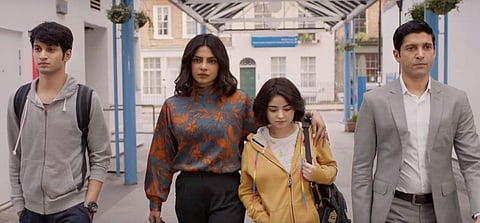

Shonali Bose’s new film, The Sky Is Pink, centres on the life of Aisha Chaudhary, a young writer and public speaker who passed away aged 18 due to pulmonary fibrosis. As a teenager, Aisha delivered inspirational talks and wrote the book My Little Epiphanies, launched a day before her death in 2015.
The film follows 25 years in the life of Aisha’s parents – Niren and Aditi Chaudhary – as they battle with their daughter’s condition while raising their son Ishaan. The story, in part, is motivated by Shonali’s own grief when she lost her teenage son to a freak accident in 2010.
In this interview, the director talks about the curious title of her film, the cultural interpretations of healing, working with Priyanka Chopra and Farhan Akhtar, and helming her first big ‘studio film’.
What was the starting point of The Sky Is Pink?
Aditi Chaudhary had reached out to me after Aisha’s death. She wanted me to make a film on her daughter. Initially, we interacted over Skype. Later on, I interviewed Aditi and Niren personally over two weeks. They talked and cried and healed through the process of those narrations.
I feel Indian culture is better equipped to deal with loss. In our families, everyone comes together and provides support. Aunts and uncles become our parents. It will never happen in western culture as it stands.
How did you land on the title?
It comes from an incident in the Chaudhary’s lives. While in London – sometime after Aisha’s bone marrow transplant – Aditi was speaking to her son Ishaan over the phone. He was just four years old then. He told her that he was punished in class for painting the sky pink. The teacher told him that sky was supposed to be blue. Hearing this, Aditi broke down over the phone.
I was deeply touched by this story. It metaphorically captured the spirit of our film — the idea that you can paint your sky any colour you want.
What did you find most unique about Aisha?
I hate it when people refer to her as a ‘motivational speaker’. They see her as this fearless girl who embraced death with a smile. But what I liked about Aisha was that she was far more human. She even wrote at one point that death is horrible and messed-up, and that she does not want to die. I did not want to put her on a pedestal. I wanted to portray her as the sassy, humorous teenager that she was.
Priyanka and Farhan are top Bollywood actors. Did they commit wholeheartedly to your vision?
As a director, I need to do workshops with my actors. I can’t have them just show up on set. Luckily, Priyanka loved working with me and had the energy to rehearse and prepare for the role. Same with Farhan. I did intense character work with him. I did not want him to imitate Niren Chaudhary but internalise his journey, playing the character in his own way. Farhan being a director himself took to the process wonderfully.
Your previous films — Amu and Margarita with a Straw — were independent works. Was it difficult helming a studio production?
It always depends on your producers. Both Ronnie Screwvala and Sidharth Roy Kapur were on the same page with me throughout. Several times I would freak out and call them, and they were always available to help. The technical assistant on this film was top-notch. So in a way, this was the easiest film I have ever made.